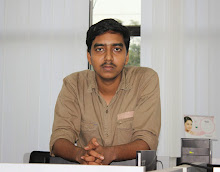The game of cricket for the blind in India was initiated by the blind themselves. Their love for a game they had been ardently following for years through radio commentaries saw them make improvisations so as to be able to play, enjoy and benefit from it.
As early as the 1970's, they started off with empty tins and sticks. Gradually the sticks changed into bats and tins were replaced with balls . The hard plastic ball with ball bearings, that is in use today was developed at NIVH, the National Institute for the Visually Handicapped, Dehradun. In the early 1980's a team from Australia visited New Delhi and played a couple of matches with a team from the Blind Relief Association. In the mid 1980's a team from Sri Lanka visited Gujarat and around the same time a team from Bangalore visited England. In 1988 the Gujarat Cup was started. This is an annual feature and to this day teams from all over Gujarat participate in this tournament.
In the year 1990 for the first time a National cricket tournament involving 19 teams from different parts of the country was organised by SCORE (Society For Communication and Research) a voluntary organisation committed to projects with the blind, projects which provide the blind with the opportunity to develop, to be rehabilitated and to be socially integrated. This first ever National tournament was the Tata Steel Challenge Cup for the Blind. The National Institute for the Visually Handicapped were the winners. Anand Sharma was adjudged the best batsman and this won him a free up and down ticket to England and back. It is not surprising that today almost a decade later Anand is the captain of the first Indian team to play the first ever World Cup.
In 1991 the 2nd National tournament the Brooke Bond Cup was held. Blindmen's Training Centre Amreli, Gujarat won the event. A new trend of Corporates sponsoring such events, which otherwise was the domain of charitable institutions, came into being. The idea behind this was that sponsorships recognised "Ability " but charity underlined "Disability."
The third tournament in Ahmedabad in 1993, the Coca-Cola Challenge Cup was yet another success. Sixteen teams participated. Shree Ramana Maharishi Academy for the Blind won the tournament in a nail biting finish between the Blind Men's Association, Ahmedabad and Shree Ramana Maharishi Academy for the Blind, Bangalore. For the first time, George Abraham, the Chairman of SCORE made a formal announcement about a World Cup in 1998, at the closing function.
In the subsequent years more and more teams wanted to participate. The National tournaments with their large numbers were becoming increasingly difficult to handle. So the set-up was further streamlined to have 4 zonals, the winners of which would meet at a national tournament. In 1994 the Zonals were held in Aligarh, Bangalore, Calcutta and Ahmedabad and the Nationals at New Delhi. Rajasthan Netraheen Seva Sang were the winners. This marked the end of the fourth tournament.
During the 5th tournament (1995) the zonals were conducted at Madras, Bombay, Chandigarh and Jamshedpur. Different venues were used in order to expose the public of different parts of the country to the game of cricket for the blind. 32 teams participated during the 1995 season. Ramana Maharishi Academy for the blind, won the event.
The sixth tournament(1996) saw zonals in Hyderabad, Patna, Jaipur and Lucknow and the nationals in New Delhi. Dhrishtiheen Khel Manch were the winners.
In September 1996 we reached a major milestone. An International Conference on cricket for the Blind was held in New Delhi. This was a SCORE initiative. Delegates from Australia, England, New Zealand, South Africa, Sri Lanka, Pakistan and India participated. An international set of rules and equipment were drawn up. The World Blind cricket Council was formed with George Abraham as its founding Chairman. India was nominated to host and organise the inaugural World Cup cricket for the blind in November 1998.
The same year the ACBI (the Association for Cricket for the Blind in India) was instituted to administer and promote the sport among the blind in the country.
The seventh national tournament (1997) was held at Hyderabad. Coca Cola had been the sole sponsors since the past three years. The zonals had been conducted at Calicut, Pune, Ludhiana and Cuttack.The team from Gujarat won the nationals. A positive fall out from these tournaments was that various institutions for the blind around the country started taking the initative and conducting state level tournaments. In the South there were tournaments in Kerala and Karnataka, in the North tournaments in Delhi and U.P., in the West in Rajasthan, Maharashtra and ofcourse Gujarat and in the East in Bengal. The ACBI dreams of the day when cricket matches will be organised in every institution that works with the blind in the country.
The World Cup will be held from the 17th to the 28th of November. The Movement of cricket for the blind in the country is at the threshold of a historical event in the country. Seven countries viz. Australia, England, New Zealand, South Africa, Sri Lanka, Pakistan and India will be vying for the top spot. A lot of planning and hard work has gone into making this event a reality.

